Online music tutoring offers students expert, flexible guidance to boost learning and creativity. Research shows music students often excel in math, reading, and science – making personalized tutoring a proven path to better grades and skills.
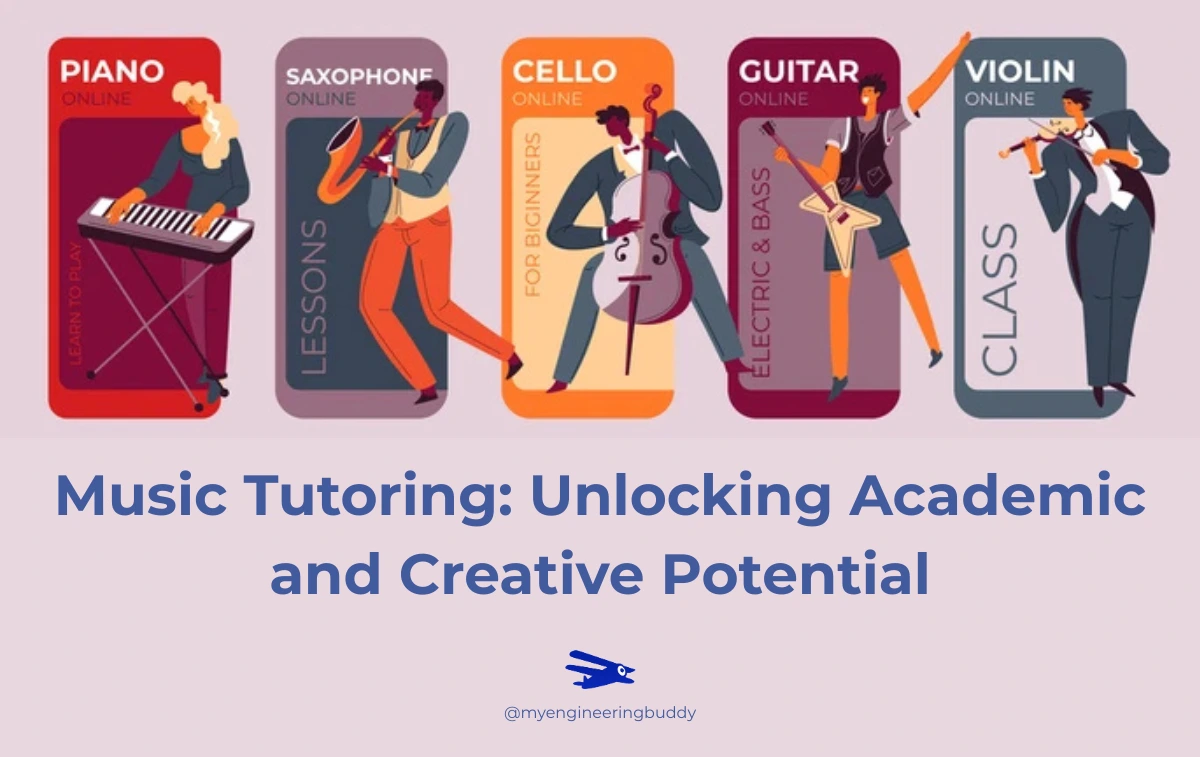
Why Music Tutoring Matters
Imagine a high school student named Alex who loves guitar but struggles with music theory homework. After a few lessons with a dedicated tutor, Alex not only understood rhythms and notation, but also gained confidence in the classroom. In Alex’s case, a few extra practice sessions with his tutor turned his B grades into A’s by the end of the term, evidence of how effective personalized attention can be. This story shows how tailored guidance can turn frustration into inspiration. Music tutoring provides that one-on-one help by adapting lessons to each student’s pace and interests, making challenging topics more accessible.
Playing a musical instrument engages the brain like a full-body workout. Studies show that practicing music activates motor, auditory, and visual centers of the brain simultaneously. Over time, this “brain exercise” strengthens memory, attention, and problem-solving skills, which can carry over into other subjects.
Research shows that playing an instrument is like a full-body workout for the brain. The illustration below maps out exactly how these cognitive boosts occur:
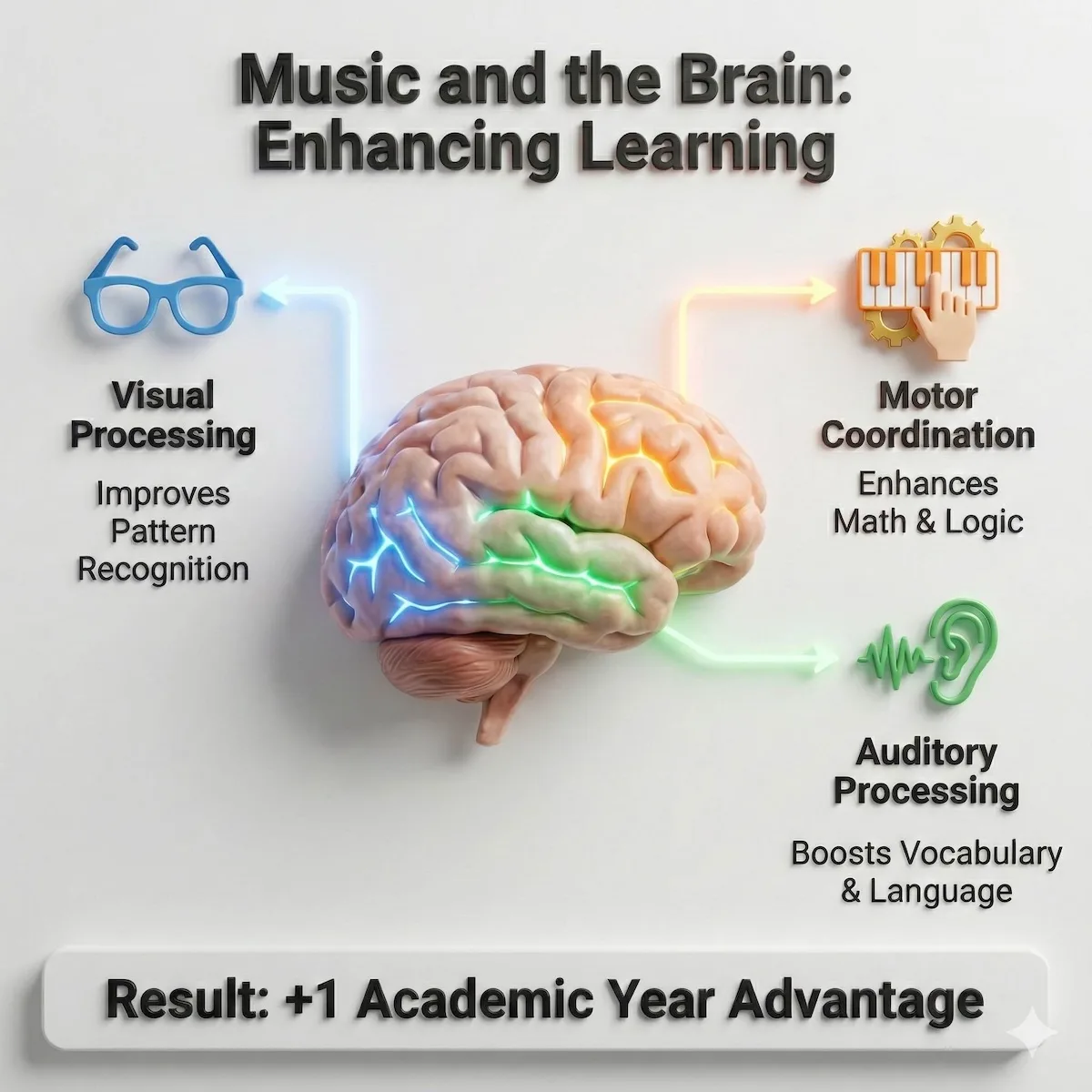
Practicing music stimulates visual, auditory, and motor areas of the brain, directly supporting skills used in math and reading.
These neurological connections explain why music students often see improvements in math and reading scores alongside their musical progress.
For example, understanding rhythms involves fractions and counting (related to math), and reading music notation improves pattern recognition. In fact, one review notes that children who study music often develop larger vocabularies and stronger reading skills than their non-musical peers. Research confirms tangible academic gains: one large study of 112,000 students found those engaged in music scored significantly higher on science, math, and English exams than peers without music training, roughly a year ahead academically. Personalized music tutoring reinforces these skills through its structured, creative challenges.
Social and Emotional Benefits
Beyond grades, music tutoring boosts confidence and social skills. Daily practice with a tutor teaches discipline and structure. Each milestone (like mastering a challenging piece) builds self-esteem. Working with a patient tutor also helps students overcome stage fright: having a safe space to perform can transform anxiety into excitement. Tutors often encourage ensemble playing or recitals, teaching students how to collaborate and express themselves effectively. All these teamwork skills and confidence carry over into the classroom, helping students become more motivated and engaged learners.
Creativity and Discipline
Music tutors also foster creativity and discipline. For example, students might compose their own short melody or improvise a solo under a tutor’s guidance, building original thinking skills. Regular practice with a tutor teaches goal-setting and time management: setting aside even 15 minutes daily for scales or songs becomes a habit. This discipline carries over to schoolwork, as students learn to organize study time and persevere through challenges.
Importance in Schools
These benefits highlight why maintaining strong music programs in schools is crucial. Unfortunately, when budgets tighten, music classes are often cut, which may hurt students in the long run. Researchers warn that removing music instruction can backfire. One study emphasized the irony that cutting music to focus on core subjects ignores the fact that “music education… can be the very thing that improves all-around academic achievement”. In other words, keeping quality music teaching in schools – and supplementing it with tutoring – helps students learn more holistically.
Music Teacher vs Music Tutor
Music Teacher (School Instructor)
A music teacher typically works in a school or conservatory, instructing classes or ensembles. They follow a set curriculum in music education, teaching fundamentals like rhythm, notation, singing, and ensemble performance. Teachers introduce concepts to many students at once, aiming to meet overall standards. For example, a teacher might demonstrate a piano scale once to the class. In a group setting, individual mistakes can be missed; if a student plays the wrong fingering, the teacher may not notice immediately, leaving some students without correction.
Music Tutor (Private Instructor)
A private music tutor provides individualized instruction outside of class. Tutors customize each lesson to a student’s specific needs and pace. For instance, if a guitar student struggles with chord shapes, the tutor will spend extra time fingering those chords until the student is comfortable. If a pianist has trouble with a tricky piece, the tutor breaks it into small sections and repeats them as needed. In a classroom of 30, these subtle errors might go unnoticed; with a tutor, the instructor will stop and correct it immediately, reinforcing good habits right away.
It’s important to understand the difference between a classroom teacher and a private tutor. This comparison highlights where a tutor adds specific value:
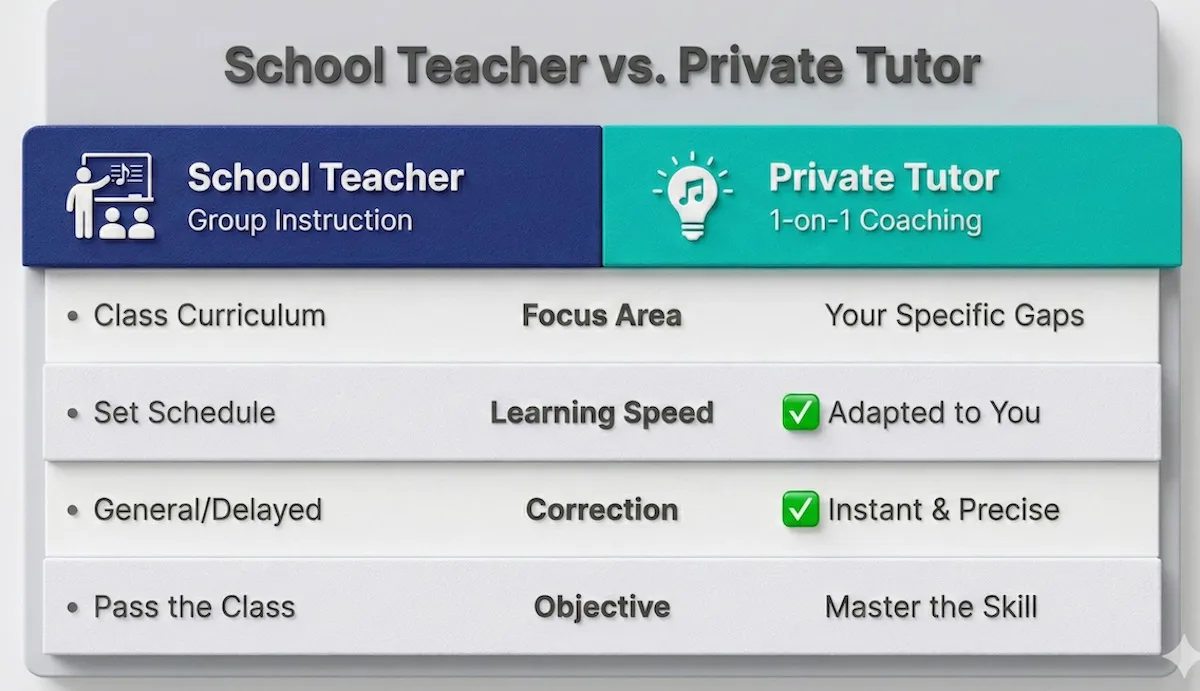
While school teachers manage entire classes, private tutors customize pacing and feedback to target your specific learning needs.
As shown above, the primary advantage of a tutor is the shift from a ‘one-size-fits-all’ curriculum to a personalized mastery approach.
Online Music Tutoring
Today, many tutors teach online, combining expertise with convenience. High-speed internet and clear audio allow real-time instruction from home. Digital tools (such as virtual keyboards, metronomes, and notation software) can be shared on screen, so tutors demonstrate techniques live. Students often record their playing and send it for feedback, and tutors can annotate videos or use digital whiteboards. These innovations mean online tutors can guide students almost as if they were in the same room. For example, a student in Dubai could study jazz improvisation with a teacher in New York, all from home. Many parents appreciate how online lessons fit into busy schedules – with no commute, even short sessions can be productive. In fact, it’s now straightforward to hire a music tutor online who fits each student’s needs and schedule.
Music students worldwide benefit equally from this model. For instance, a piano student in London can study classical technique with a teacher in Vienna, and a violinist in Abu Dhabi can take lessons with an expert in Los Angeles. Geography no longer limits access to quality music teaching; these global connections enrich every student’s learning experience.
Finding the Right Music Tutor
With many options available, it helps to research before committing. Start by defining your goals: Are you learning an instrument, studying music theory, preparing for an exam or performance, or needing music homework help? This will guide your search. Next, consider qualifications: experienced tutors often list their degrees, certifications, or performance backgrounds; even certain specializations of music application, like a degree in music therapy. Ask if they’ve prepared students for music exams (like ABRSM, college auditions, or AP Music Theory). Many online platforms allow you to view tutor profiles and student reviews. You can also ask your school or local music teachers for recommendations. Once you have a shortlist, interview each tutor to make sure they understand the curriculum and your learning style.
Finding the right mentor doesn’t have to be guesswork. Follow this simple roadmap to identify the best candidate for your needs:
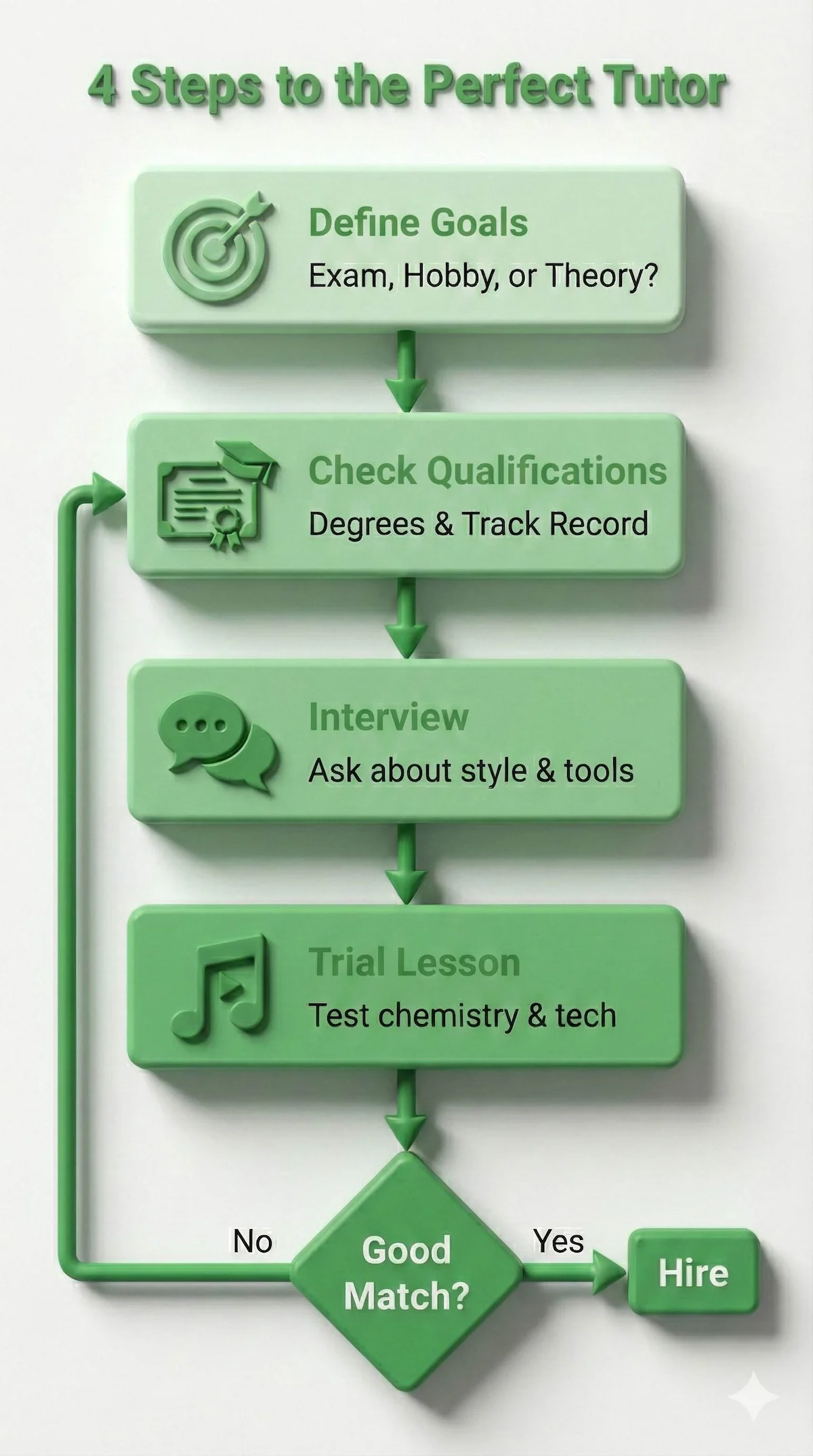
Follow this four-step roadmap to ensure you hire a tutor who matches your specific musical goals and learning style.
Don’t skip the trial lesson—it’s the only way to verify that the tutor’s teaching style clicks with the student’s personality.
Key Considerations:
- Experience: A tutor who regularly teaches your specific level (e.g. middle school band, college theory, or an instrument exam) can anticipate common challenges. Formal credentials (like music degrees or teaching certificates) are a plus, but a proven track record (reviews or student success) often matters more.
- Teaching Style: The right tutor matches the student’s personality. A patient, encouraging tutor makes practice feel rewarding. During a trial lesson, notice if the tutor explains concepts clearly and keeps the student engaged and motivated.
- Resources: Good tutors come prepared with tools. They might use ear-training apps, share custom practice sheets, or provide recorded examples. Ask what materials they use during lessons and whether they set practice assignments between sessions.
- Flexibility: Many tutors offer evening and weekend slots, which is great for busy schedules. Online tutoring adds even more options: you may find an expert tutor halfway around the world with availability that suits your timing.
- Rates: In the USA, online music lessons typically cost around $25–$45 per hour, with in-person around $30–$55 per hour. Prices vary by expertise and location. Remember, this is an investment in learning – many families find the benefits outweigh the cost. Ask if the tutor offers package discounts or group rates.
- Trial and Reviews: Always start with a trial lesson if possible. Check reviews or ask for references. Hearing about other students’ improvement can give you confidence that the tutor will help in your situation.
Music Homework and Assignment Help
Music courses often include challenging homework and projects. A tutor can break these tasks into manageable steps. For example, if an assignment is to analyze a chord progression, the tutor might first identify the key signature, then walk through each chord’s function step-by-step. If the task is to compose a melody, the tutor could guide the student in choosing a scale, writing a motif, and developing it into a song. For written assignments (like a report on music history), tutors help outline the main ideas and research sources so the student learns the content rather than just copying answers. This hands-on help ensures understanding and better grades.
Advanced courses especially benefit from extra help. Consider AP Music Theory: it covers intricate topics like four-part harmony and counterpoint. In 2024, only about 60% of test-takers earned a passing score (3 or higher), underlining its difficulty. A tutor can offer targeted review sessions for test prep, with practice exams and mnemonic tips. College music students often seek tutoring for composition or advanced theory as well. In these cases, tutors might listen to draft compositions and suggest improvements or clarify difficult concepts, helping students succeed in demanding curricula.
Tutors also help with time management. Learning music alongside other schoolwork requires discipline. A tutor might help a student set a realistic daily practice schedule – for example, 20 minutes on technique, 15 minutes on sight-reading, and 10 minutes reviewing assignments. This structure prevents last-minute cramming and builds steady improvement. Over months, these small guided steps lead to big gains in skill and confidence.
Structuring practice time is often harder than the playing itself. Here is a breakdown of an effective 45-minute session:
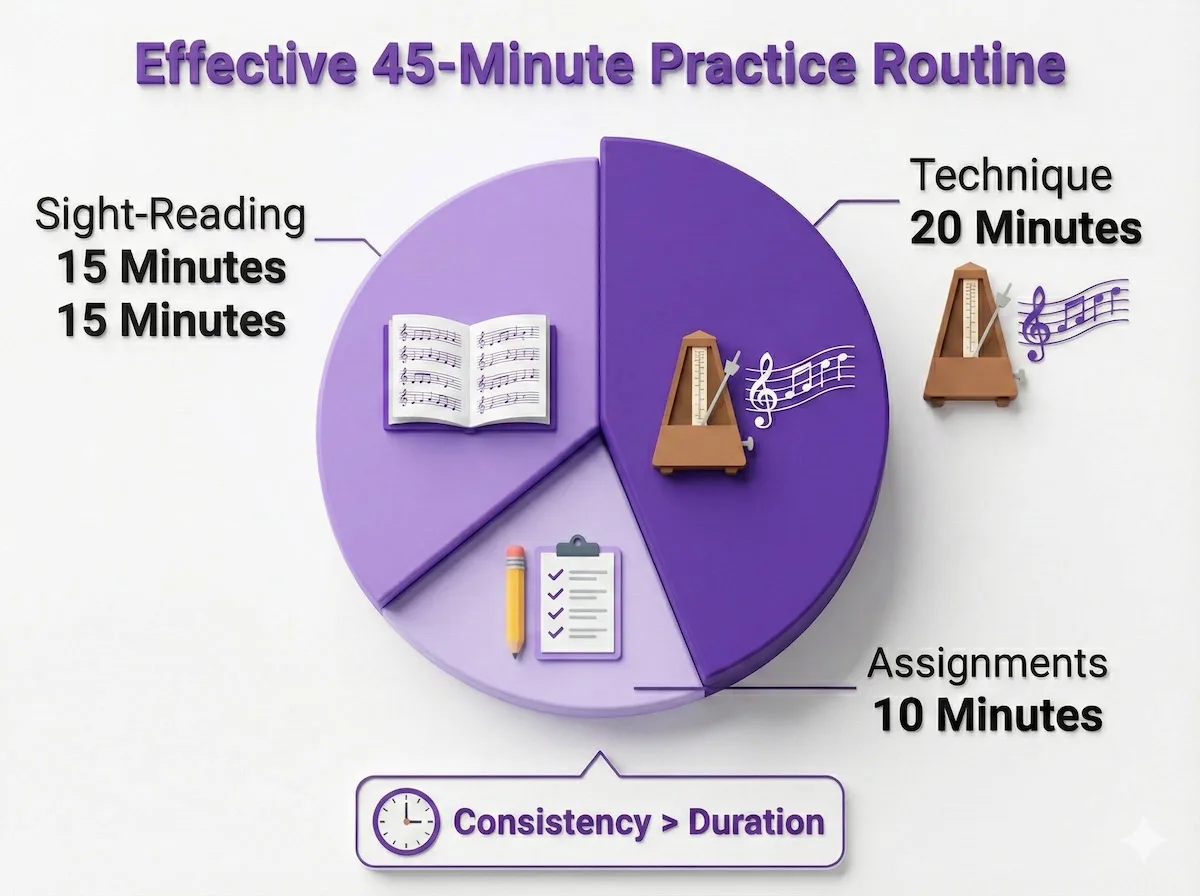
A balanced practice session covers technique, new material, and review—preventing burnout while ensuring steady progress.
Sticking to this ratio ensures you build technical skill without neglecting sight-reading or current homework assignments.
At the college level, music tutoring can also support specialized needs. For example, a music major might work with a tutor to refine an audition piece or master an instrument technique at an advanced level. Even graduate students writing theses on music theory or history may consult a tutor to outline complex analyses. In all cases, having a dedicated mentor accelerates learning and deepens understanding.
In summary, music tutors provide both academic support and mentorship. They answer questions as they come up and assign targeted practice to address weaknesses. Whether a student needs guidance on a tricky homework problem, feedback on a performance, or someone to encourage them through practice, a qualified music tutor can make the learning process smoother and more effective.
Frequently Asked Questions (FAQs)
- What is music tutoring? Music tutoring is personalized one-on-one instruction from a qualified tutor, designed to improve a student’s skills on an instrument, in music theory, composition or any music coursework.
- How does a music tutor differ from a music teacher? A music teacher usually leads group classes or ensembles in a school setting, while a music tutor focuses on individual lessons tailored to the student’s specific challenges and pace.
- Can music tutoring help improve my grades? Yes – many studies link music learning to higher academic performance. For example, one large study found that students involved in music score significantly higher in math, science and English, and targeted tutoring can help students reinforce those skills.
- Is online music tutoring as effective as in-person? With reliable internet, online music tutoring can be highly effective. It offers real-time instruction and immediate feedback without travel, and allows students to work with expert teachers from anywhere in the world.
- What kind of help can I get from a music tutor? Tutors can assist with everything from practicing your instrument correctly to understanding theory concepts, completing assignments, preparing for exams, and improving performance technique.
- How do I hire a music tutor? You can hire a music tutor through online platforms or local music schools. Research tutors with the right experience and style, look for trial sessions or reviews, and choose someone who fits your schedule and goals. Many families find that hiring a music tutor online is easy and affordable, thanks to platforms that let you compare tutors and pricing.
Related Subjects:
******************************
This article provides general educational guidance only. It is NOT official exam policy, professional academic advice, or guaranteed results. Always verify information with your school, official exam boards (College Board, Cambridge, IB), or qualified professionals before making decisions. Read Full Policies & Disclaimer , Contact Us To Report An Error
